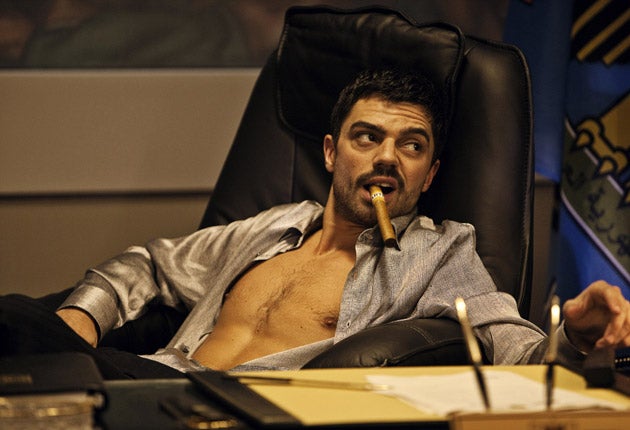The Devil's Double, Berlin Film Festival
Cooper excels as Saddam's son

The Devil's Double tells the extraordinary story of Latif Yahia, the Iraqi army lieutenant who became the stand-in for Saddam Hussein's sadistic son, Uday. The director Lee Tamahori isn't remotely interested in the minutiae of Iraqi politics.
This is a gangster film that has far more in common with Scarface than with the spate of recent Iraq-themed movies (Green Zone, The Hurt Locker, In the Valley of Elah). The screenplay, by Michael Thomas, isn't subtle in the slightest. Sex and violence are the prime ingredients. However, what would otherwise have been a sleazy exploitation picture is lifted by Tamahori's flair for filming action and by an exceptional performance from the British actor Dominic Cooper in the dual role of Uday and his double.
Cooper relishes playing the "real" Uday, a buck-toothed psychopath with a disarmingly squeaky voice who behaves like an Iraqi version of Caligula. We see him perpetrating horrific acts of violence. Between the murders, rapes and torture, he behaves like a petulant child. By contrast, Cooper's Latif is a soulful, morose figure. He may look identical to the young despot, dress in the same clothes and speak in the same tone, but we're never in any doubt which character we are watching.
The narrative structure is choppy and repetitive. Latif falls for one of Uday's "girlfriends" (Ludivine Sagnier in wigs and heels, doing a fair impersonation of a femme fatale from a 1940s film noir). He begins a torrid affair with her behind Uday's back, but can do nothing about Uday's misdeeds. The dictator's son feels a strange affection for his "double", and he pampers and bullies him by turn, giving him a Rolex watch one moment and then thrashing him for insubordination the next. He is flattered by how effectively Latif is able to impersonate him.
Every so often, Saddam Hussein hoves into view. He, too, has a double. In one nicely observed comic scene, we see Hussein and his doppelganger dressed in whites, having a strangely well-behaved game of tennis.
One problem with the film is that Uday is so utterly despicable that it's hard to identify with him or to understand how Latif is prepared to spend so much time in such close proximity to him. The many scenes set in discos or at Uday's debauched parties become wearisome.
The film-makers don't so much play fast and loose with history, as ignore it altogether. They throw in token snippets of newsreel footage – clips of the first Gulf War and George Bush Snr. chiding Hussein – but these are just framing devices. The ending of the film is closer to that of a James Bond or Jason Bourne movie than it is to actual events in Iraq history.
Cooper is a very long way removed from the world of Alan Bennett's The History Boys, the play in which he first made his name. However, what's admirable about his dual performance here is that he shows a certain restraint. He doesn't just indulge in Al Pacino-like histrionics. His Uday is cunning and insecure. Even as he chews on cigars, waves guns around and picks up girls, we're always aware what a pathetic figure he really is. Meanwhile, as Latif, Cooper somehow manages to lend a little emotional depth to a film which would have seemed like a retrograde boys' own fantasy adventure from the Nuts and Loaded school of film-making without him.
Join our commenting forum
Join thought-provoking conversations, follow other Independent readers and see their replies
Comments